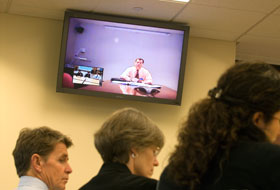  |
| HOME | THIS ISSUE | CALENDAR | GRANTS | BACK ISSUES | < BACK | NEXT > |
Master’s program designed to enhance physicians’ teaching skillsby Kristina Goodnough - January 29, 2007 | ||||
| UConn's School of Medicine is collaborating with the Neag School of Education to establish a fellowship in medical education. The fellowship will be a 30-credit program leading to a master's degree in education with an emphasis in adult learning. It will be offered specifically to physicians during their training in a clinical specialty or subspecialty at two teaching hospitals in Bridgeport - the state's largest city - as well as at the Health Center. "Many physicians are involved in teaching medical students, residents, and physicians, and they occupy critical leadership positions in medical education," says Dr. Thomas Van Hoof, associate dean of continuing and community education. "Unfortunately, many of them lack specific training in adult learning. Our fellowship will be offered during a key phase of training. It is designed to help physicians obtain the expertise they need to teach other adults most effectively." Van Hoof is a member of the fellowship planning group with Dr. Bruce Koeppen, dean for academic affairs and education at the Health Center, and Professor Barry Sheckley, head of the Department of Educational Leadership in the Neag School of Education. "Educational programs for adults often are set up as though they learn in the same manner as children," says Sheckley. "Adults learn in a very different way, via a multi-faceted, experience-based process. Since they have a wide reservoir of prior experiences, learning requires that new information engage and be integrated with those prior experiences." The collaboration between the medical school and the Neag School is very significant, says Sheckley.
"Our research and experience in adult learning has proven effectiveness in a wide variety of settings. We believe the research can have a similar, positive impact on the field of medical education." Van Hoof says medical education is increasingly important as a way to change clinician behavior and improve patient health outcomes, and is part of a larger quality improvement agenda. "A recent study noted that only 55 percent of patients receive recommended care for the most common health conditions. Part of the blame for the lackluster performance of the health care system rests with medical education," he says. The fellowship program will be available to residents and fellows pursuing clinical training at the Health Center, Bridgeport Hospital, and St. Vincent's Medical Center. "I'm confident that the activities and programs undertaken by the fellows will enhance medical education at all the institutions involved," says Van Hoof. The program will also benefit the state in general, since many of the participating physicians will remain in Connecticut following their training. The first students are expected to be enrolled in the fall. |
| ADVANCE HOME UCONN HOME |

